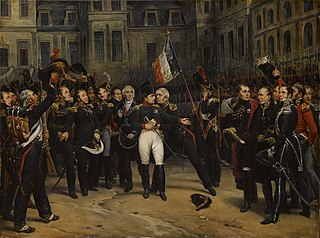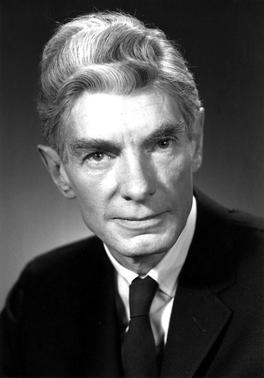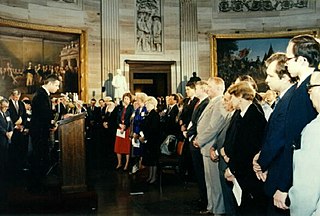
Dwight David Eisenhower was an American military officer and statesman who served as the 34th president of the United States from 1953 to 1961. During World War II, he was Supreme Commander of the Allied Expeditionary Force in Europe and achieved the five-star rank as General of the Army. Eisenhower planned and supervised two of the most consequential military campaigns of World War II: Operation Torch in the North Africa campaign in 1942–1943 and the invasion of Normandy in 1944.
A perpetual war, endless war or forever war is a lasting state of war with no clear conditions that would lead to its conclusion. These wars are usually situations of ongoing tension that may escalate at any moment, similar to the Cold War. From the late 20th century, the concepts have been used to critique the United States Armed Forces interventions in foreign nations and the military–industrial complex such as the Vietnam War and the Soviet-Afghan War, or wars with ambiguous enemies such as the war on terror or war on drugs.

The Sputnik crisis was a period of public fear and anxiety in Western nations about the perceived technological gap between the United States and Soviet Union caused by the Soviets' launch of Sputnik 1, the world's first artificial satellite. The crisis was a significant event in the Cold War that triggered the creation of NASA and the Space Race between the two superpowers. The satellite was launched on October 4, 1957, from the Baikonur Cosmodrome. This created a crisis reaction in national newspapers such as The New York Times, which mentioned the satellite in 279 articles between October 6, 1957, and October 31, 1957.
The military–industrial complex (MIC) is a phrase originally coined by U.S. President Dwight D. Eisenhower to describe the relationship between the military and the defense industry that supplies it with weapons, equipment, and services.

Big science is a term used by scientists and historians of science to describe a series of changes in science which occurred in industrial nations during and after World War II, as scientific progress increasingly came to rely on large-scale projects usually funded by national governments or groups of governments. Individual or small group efforts, or small science, are still relevant today as theoretical results by individual authors may have a significant impact, but very often the empirical verification requires experiments using constructions, such as the Large Hadron Collider, costing between $5 and $10 billion.
In social science and economics, corporate capitalism is a capitalist marketplace characterized by the dominance of hierarchical and bureaucratic corporations.

A farewell speech or farewell address is a speech given by an individual leaving a position or place. They are often used by public figures such as politicians as a capstone to the preceding career, or as statements delivered by persons relating to reasons for their leaving. The term is often used as a euphemism for "retirement speech," though it is broader in that it may include geographical or even biological conclusion.

The Kennedy Doctrine refers to foreign policy initiatives of the 35th President of the United States, John Fitzgerald Kennedy, towards Latin America during his administration between 1961 and 1963. Kennedy voiced support for the containment of communism as well as the reversal of communist progress in the Western Hemisphere.

A speechwriter is a person who is hired to prepare and write speeches that will be delivered by another person. Speechwriters are employed by many senior-level elected officials and executives in the government and private sectors. They can also be employed to write for weddings and other social occasions.

Dwight D. Eisenhower's tenure as the 34th president of the United States began with his first inauguration on January 20, 1953, and ended on January 20, 1961. Eisenhower, a Republican from Kansas, took office following his landslide victory over Democratic nominee Adlai Stevenson in the 1952 presidential election. Four years later, in the 1956 presidential election, he defeated Stevenson again, to win re-election in a larger landslide. Eisenhower was limited to two terms and was succeeded by Democrat John F. Kennedy, who won the 1960 presidential election.

Malcolm Charles Moos was an American political scientist, speechwriter, and academic administrator. He was a professor of political science at Johns Hopkins University for two decades. As a speechwriter, Moos wrote President Dwight Eisenhower's final warning about the influence of the military-industrial complex in 1961. Moos then served as the president of the University of Minnesota from 1967 to 1974.

The industrial complex is a socioeconomic concept wherein businesses become entwined in social or political systems or institutions, creating or bolstering a profit economy from these systems. Such a complex is said to pursue its own interests regardless of, and often at the expense of, the best interests of society and individuals. Businesses within an industrial complex may have been created to advance a social or political goal, but mostly profit when the goal is not reached. The industrial complex may profit financially, or ideologically, from maintaining socially detrimental or inefficient systems.

The Complex: How the Military Invades Our Everyday Lives is a book about the United States military, written by journalist Nick Turse. It was published in 2008 in hardcover format by Metropolitan Books. The book describes the vast changes in the industrial complex of the U.S. military from the days of President Dwight D. Eisenhower to 2008, its effect on American society, and how the military and private business spheres interact with each other. The book received positive reviews in Mother Jones and Inter Press Service, and a critical review in Kirkus Reviews.
Ralph E. Williams was born at Pecos, Texas and earned a B.B.A. at the University of Texas at Austin in 1938.

The Days of Remembrance of the Victims of the Holocaust (DRVH) is an annual eight-day period designated by the United States Congress for civic commemorations and special educational programs that help citizens remember and draw lessons from the Holocaust. The annual DRVH period normally begins on the Sunday before the Israeli observance of Yom HaShoah, Holocaust Memorial Day, and continues through the following Sunday, usually in April or May. A National Civic Commemoration is held in Washington, D.C., with state, city, and local ceremonies and programs held in most of the fifty states, and on U.S. military ships and stations around the world. The United States Holocaust Memorial Museum designates a theme for each year's programs, and provides materials to help support remembrance efforts.
The Chance for Peace speech, also known as the Cross of Iron speech, was an address given by U.S. President Dwight D. Eisenhower on April 16, 1953, shortly after the death of Soviet leader Joseph Stalin. Speaking only three months into his presidency, Eisenhower likened arms spending to stealing from the people, and evoked William Jennings Bryan in describing "humanity hanging from a cross of iron." Although Eisenhower, a former military man, spoke against increased military spending, the Cold War deepened during his administration and political pressures for increased military spending mounted. By the time he left office in 1961, he felt it necessary to warn of the military-industrial complex in his final address.
The 1955 State of the Union Address was given by the 34th president of the United States, Dwight D. Eisenhower, on Thursday, January 6, 1955, to the 84th United States Congress. He said, "Every citizen wants to give full expression to his God-given talents and abilities and to have the recognition and respect accorded under our religious and political traditions." He also said, "To protect our nations and our peoples from the catastrophe of a "nuclear holocaust", free nations must maintain countervailing military power to persuade the Communists of the futility of seeking their ends through aggression." He is referring to what seemed to be the high likelihood of nuclear warfare of the time. He ended with, "And so, I know with all my heart--and I deeply believe that all Americans know--that, despite the anxieties of this divided world, our faith, and the cause in which we all believe, will surely prevail." This address was given in his first term (1953-1957), in Washington, D.C.
The presidency of Dwight D. Eisenhower began on January 20, 1953, when Dwight D. Eisenhower was inaugurated as the 34th president of the United States, and ended on January 20, 1961.

Donald Trump's farewell address was the final official speech of Donald Trump as the 45th President of the United States, delivered as a recorded, online video message on January 19, 2021. The farewell address was delivered the day before Joe Biden, who defeated him in the 2020 United States presidential election, was sworn in as his successor. Trump was the first president to not attend his successor's inauguration since Andrew Johnson in 1869.
The 1959 State of the Union Address was given by Dwight D. Eisenhower, the 34th president of the United States, on Friday, January 9, 1959, to the 86th United States Congress in the chamber of the United States House of Representatives. It was Eisenhower's seventh State of the Union Address. Presiding over this joint session was House speaker Sam Rayburn, accompanied by Vice President Richard Nixon, in his capacity as the president of the Senate. The speech was broadcast by radio and television.











